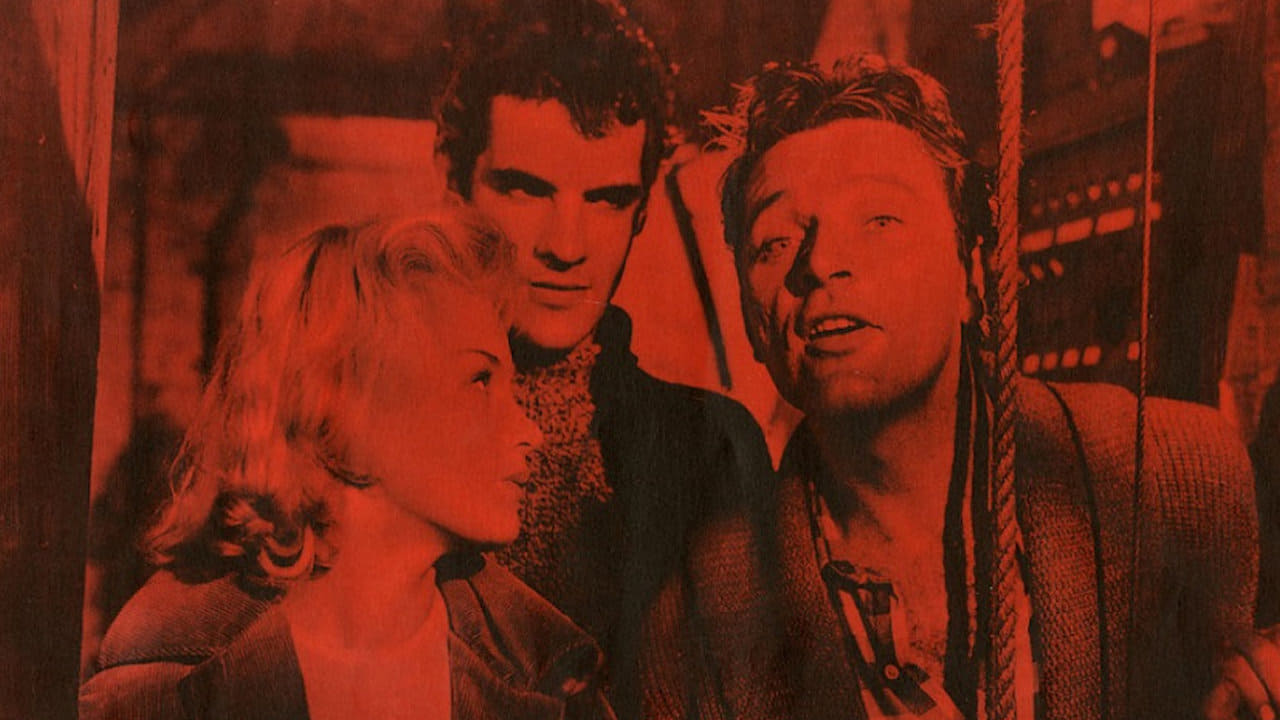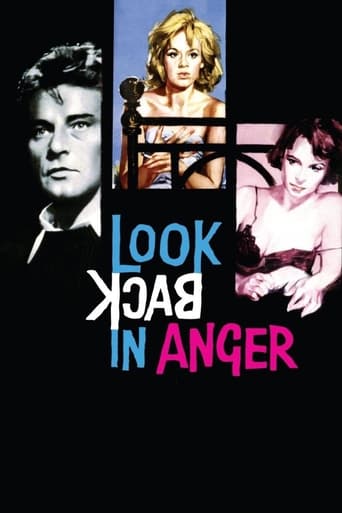

Redundant and unnecessary.
... View MoreAdmirable film.
... View Moreit is the rare 'crazy' movie that actually has something to say.
... View MoreExcellent characters with emotional depth. My wife, daughter and granddaughter all enjoyed it...and me, too! Very good movie! You won't be disappointed.
... View MoreOutstandingly written and directed movie, that many people simply won't like. It has some overly acted scenes but is easily understood if you know the actors' style. The passion that they portray in this movie seems overdone, but still amazing. At times, it's confusing, illogical and angry but again, amazing. Regardless, I could hardly wait to see what would happen next. There's jealously, sex, infidelity and death. Some of which is way ahead of it's time in 1959.Angry was Burton. Reviewing movies just to write for the negatives in their reviews, like EdwardC, (37), all reviews are one star except two, is similar to the role Burton was playing.
... View MoreJohn O'Hara, one of the finest American writers of the 20th century, said when discussing writing that if you get the small things right you'll get the big things right ... Having opted to 'open out' John Osborne's one-set, four character play, director Tony Richardson, opens in a Jazz club where Jimmy Porter is sitting in on trumpet with Chris Barber's band _ I can't in all honesty use the word 'jazz' and Chris Barber in the same sentence. So far, so good; in the original play Jimmy Porter is heard several times playing a trumpet off-stage and his wife, Alison, mentions to Helena Charles at one stage that Jimmy had once had his own jazz band. Trouble is that Chris Barber played 'trad' or traditional New Orleans-style jazz and when we follow Jimmy to his bed-sit the posters on his wall feature Gerry Mulligan and the Modern Jazz Quarter, both at the opposite end of the spectrum to Barber, indeed the trumpet player with Mulligan's Quarter was super-cool Chet Baker so right away Richardson has undermined Porter's character. He's also slashed the play's opening scene which was brilliant theatre and presented economically all the key points of the play. Against that is Burton's outstanding performance outshone only by that of Edith Evans who is equally effective UNDERplaying in the two scenes she has as Burton is by overplaying. By coincidence the NFT also screened a 1976 television revival of the play (exactly as written) in the same month which allows for comparing and contrasting. Merely by having Burton in it the film comes out on top but writing-wise the play triumphs.
... View MoreInterestingly, for a film celebrated for its unrelenting realism, 'Look Back in Anger (1958)' is entrenched in theatricality. From the compact cast, the cramped sets, and the verbose dialogue, I guessed (correctly, as it turned out) that Tony Richardson's film was surely adapted from a play. John Osborne's production of "Look Back in Anger" initially premiered in 1956 to considerable success, and the characteristic harshness of his writing, exposing the unpleasant underbelly of working-class life, spawned the phrase "angry young men" to describe Osborne and other British playwrights who explored similar themes. Richardson's film triggered what is often described as a British New Wave, a movement of important (or perhaps self-important) films that explored pressing political issues and, in particular, the social alienation borne from class distinction. Easily the best example I've come across so far is Jack Clayton's 'Room at the Top (1959),' which obviously followed in the footsteps of this picture. The film's strong, intimate cast includes Richard Burton, Claire Bloom (of Chaplin's 'Limelight (1952)'), Mary Ure, Gary Raymond and Donald Pleasence.Over the years, many films have explored the anger and prejudices of disturbed and alienated men. But, even in the most powerful of these such as Scorsese's 'Taxi Driver (1976)' and 'Raging Bull (1980)' the filmmaker distances himself from his characters' prejudices. 'Look Back in Anger' doesn't seem to do this. Whether it's Osborne's dialogue, or Burton's phenomenal execution, everything Jimmy Porter says comes across as a genuinely bitter attack on contemporary society. When Porter questions the worth of his wife, or cruelly disparages her middle-class parents, the attack seems to be coming from the author himself {my research tells me that Osborne's play was strongly autobiographical, based on his failed marriage to Pamela Lane this offers some explanation for the apparent bitterness}. In fact, so venomous is Porter's tongue that wife Alison is afraid to reveal to him that she's pregnant, and, shockingly, he appears not to care, in any case. Only towards maternal-figure Mrs Tanner (Edith Evans) does he show genuine compassion, his hostility is only amplified by her passing.Richard Burton, however tied to the stage is his performance, nonetheless commands the screen in every scene. His anger is so pure and undiluted, made all the more shocking because he otherwise speaks with the eloquence of an educated and civilised man. If its dialogue is undoubtedly tied to the stage, then 'Look Back in Anger' achieves realism through its more cinematic traits. The film was photographed by Oswald Morris a talented cinematographer who also worked with, among others, Stanley Kubrick, John Huston and Carol Reed who exquisitely captures the shadowy decadence of working-class London. There's a grittiness to Porter's squalid surroundings, sometimes he almost seems trapped in a noirish urban backwater. Stylistically, the film closely resembles Lean's 'Brief Encounter (1945)' probably because both have brilliant scenes set on a railway platform, amid the smoke of a idle locomotive. Subsequent "kitchen sink" dramas also owe their visual aesthetic to Morris' work here, just as British cinema owes its brief late-1950s revival to Osborne and Richardson.
... View MoreSimply miserable film with Richard Burton angry at the whole world. Was he practicing for "Who's Afraid of Virginia Woolf?"Jimmy (Burton) can be described as being angry at society. What's his gripe?The tragic Mary Ure appears as his wife. Her tragedy was that she was a wonderful actress who unfortunately died so young. She is subjected to Burton's outbursts and eventually walks out on him.How lucky Edith Evans was to die in this film. Dame Edith had to contend with this incredible bad writing.A young and lovely Clare Bloom comes to visit and gets her friend (Ure) to leave this abuse. Then what happens? Bloom takes up with Burton. Come on. This is amateurish at best. Everyone seems to be walking out on poor Richard in this film. Yes, too many of us lost parents at a young age,but we didn't act with such hostility as Richard Burton did in this film.Even a plausible ending can't rescue this mess.I loved Burton on the trumpet.
... View More